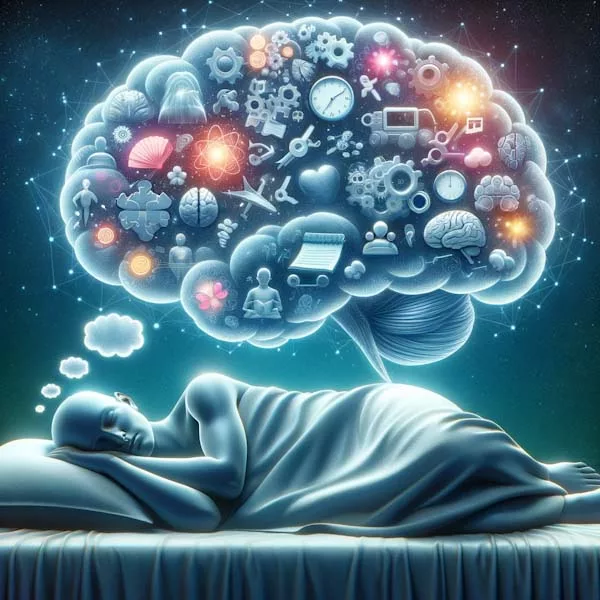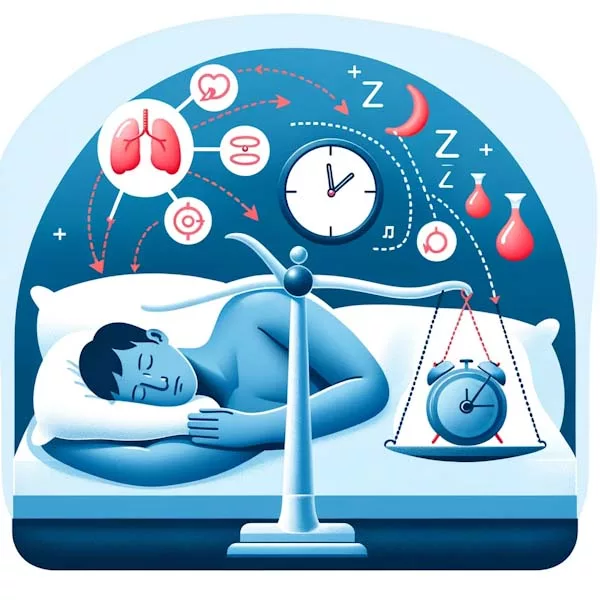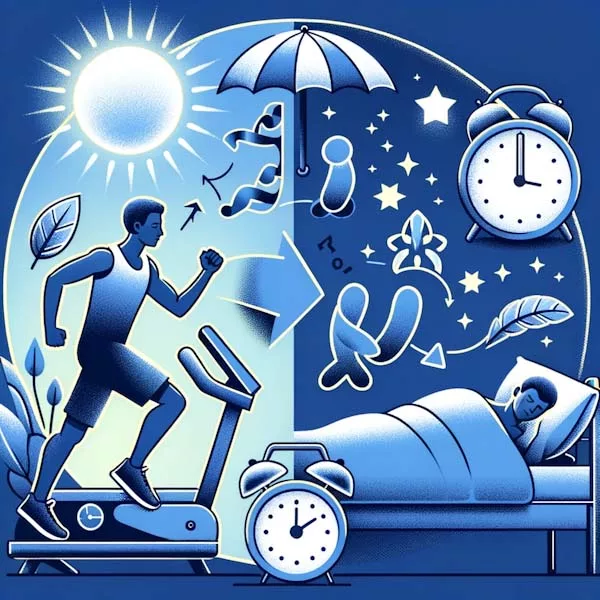Sleep, often overlooked in our busy lives, is a critical component of overall health. This article explores the substantial yet often understated impact of sleep on physical restoration, brain function, emotional balance, and heart health. Here, you’ll find clear and compelling reasons to give sleep the priority it deserves in your daily routine. Along with this insight, the article offers practical, straightforward strategies to enhance your sleep hygiene. These tips, rooted in simplicity and effectiveness, can lead to significant improvements in both your personal and professional life. By understanding and applying these principles, you can harness the benefits of good sleep and witness its transformative effects on your well-being and productivity.
Reaping the Benefits of Good Sleep
Good sleep is essential, impacting everything from brain processing and memory consolidation to physical health and emotional well-being. This section explores how quality sleep aids in brain detoxification, supports immune system strength, regulates metabolism, and even contributes to heart health. Understanding these aspects can shift our perspective on sleep from a passive activity to an active tool for improving our daily lives and long-term health.
Brain Processing and Memory Improvement: Supporting neurological health and cognitive functions, sleep helps the brain process and consolidate memories from the day. This involves converting short-term memories into long-term memories and organizing information, crucial for learning and cognitive function and sleep.

Detoxification of the Brain: The glymphatic system, a waste-clearance system in the brain, is most active during sleep. It removes waste products, including proteins like beta-amyloid associated with Alzheimer’s disease. This brain detoxification process is essential for maintaining brain health and Alzheimer’s prevention.
Cellular Repair and Growth: Sleep promotes the release of growth hormones, facilitating cell growth and repair. This process is vital for muscle growth, tissue repair, and protein synthesis.
Immune System Strengthening: Sleep directly impacts the immune system. Adequate sleep strengthens the body’s immune response, helping to fend off infections and diseases. Conversely, sleep deprivation can weaken the immune system, increasing susceptibility to illnesses.
Metabolic Regulation and Weight Management through Sleep: Sleep plays a significant role in regulating metabolism and maintaining a healthy balance of hormones that affect appetite and weight, like ghrelin and leptin.

Emotional Processing: Crucial for emotional regulation, sleep helps the brain process emotions and experiences, contributing to mental and emotional health. Adequate sleep aids in managing stress, anxiety, and mood.
Heart Health Maintenance: During sleep, blood pressure and heart rate typically decrease, allowing the heart and blood vessels to rest and recover, reducing the risk of heart-related conditions and contributing to cardiovascular health.
Energy Conservation and Restoration: During sleep, the metabolic rate slows and energy consumption is reduced, allowing the body to restore its energy reserves for the next day.
The Consequences of Poor Sleep Quality
Poor sleep quality leads to impaired cognitive functions such as reduced alertness and decision-making ability, increasing the risk of accidents and diminishing productivity. Effects of sleep deprivation include serious mental health issues like depression and anxiety and exacerbates physical health problems, including obesity, heart disease, and diabetes. Lack of restorative sleep disrupts the body’s essential repair processes, weakens the immune system, and can significantly degrade overall quality of life and long-term health.
Mastering Sleep Hygiene for Better Sleep
Sleep hygiene is much more than a checklist; it’s a comprehensive approach to setting up your nights for the best possible rest. It involves making mindful choices during the day, following a consistent sleep schedule, creating a peaceful sleeping environment, and crafting a pre-sleep routine that calms the mind and body. These habits help regulate the body’s internal clock, promote relaxation, and reduce sleep disturbances, leading to quicker sleep onset and deeper, more restorative sleep cycles. In this section, we’ll explore the essential practices that can turn your sleep into a rejuvenating experience.
Diet for Better Sleep

A balanced diet plays a crucial role in promoting good sleep. It’s important to time meals appropriately and choose foods that support sleep.
Meal Timing: Finish your last meal at least 3 hours before bedtime to allow for digestion. Ideal times are between 5 p.m. and 7 p.m. An empty stomach generally makes falling asleep easier.
Breakfast and Lunch: Start your day with a modest, nutritious breakfast and enjoy the heaviest meal at lunchtime, between 10 a.m. and 2 p.m., as per Ayurvedic principles. This aligns with the body’s natural digestion cycle.
Dinner Choices: Opt for light, easily digestible suppers. Soups are a fantastic option. Fish, turkey, chicken, or legumes, paired with cooked or steamed vegetables and complex carbohydrates are also great choices. Add a bit of healthy fats like avocado, olive oil, and nuts. Avoid heavy, raw, or sugary foods, as well as wine and spirits, which can disrupt sleep.
Nutrients for Sleep: Include foods rich in sleep-promoting nutrients like magnesium and tryptophan. Tryptophan, found in milk, turkey, oats, and nuts, aids in sleep by reducing anxiety and relaxing muscles. Omega-3 and omega-9 fatty acids, beneficial for sleep patterns, can be found in foods like wild-caught salmon, chia seeds, and almonds. Limit omega-6 fats, commonly found in processed foods.
Evening Beverages: Drink calming herbal beverages like chamomile or valerian root tea, or Golden Milk with a pinch of nutmeg, to relax before bed. Keep the quantity moderate to avoid a full bladder during the night.
Avoiding Processed Foods: Steer clear of processed foods, especially for dinner, as they can hinder digestion and disrupt sleep.
Exercise and Sleep Patterns

Exercise stimulates the release of endorphins and reduces stress and anxiety, common barriers to restful sleep. Additionally, physical activity increases the duration of deep sleep, the most restorative sleep phase.
Engaging in physical activity, particularly aerobic exercises, helps to regulate the body’s internal clock and improves sleep onset and deeper sleep phases. It’s important to time exercise correctly, as engaging in intense workouts close to bedtime can lead to increased alertness, potentially hindering the ability to fall asleep. Ideally, exercise should be done earlier in the day to maximize sleep benefits.
Benefits of Natural Light for Sleep

Exposure to natural light, particularly in the morning, plays a crucial role in regulating the sleep-wake cycle and improving sleep quality. This exposure helps synchronize the body’s internal clock, promoting a healthy rhythm of sleep and wakefulness.
Reduce indoor lighting as evening approaches, aligning with the natural decrease in outdoor light after sunset. The absence of light signals your brain that it’s time to wind down and aids in the natural production of melatonin, the hormone responsible for inducing sleep. Bright artificial lights can hinder melatonin secretion, disrupting the body’s preparation for sleep.
Relaxing Pre-Sleep Activities
Establishing relaxing pre-sleep rituals, like meditation, journaling, or reading, helps signal your body to wind down, facilitating the transition into a restful state essential for quality sleep and overall well-being.
Stress Management Techniques for Better Sleep
Techniques like meditation, deep breathing exercises, or mindfulness practices help calm the mind, ease anxiety, and create a peaceful state conducive to sleep.
Journaling for Mental Clarity

Maintaining a journal is an effective way to clear your mind before sleep. By documenting nagging thoughts and plans, you release them from your mind and thereby reduce the likelihood of sleep disturbances. Additionally, journaling to set intentions for the next day aligns your subconscious with conscious goals, paving the way for a more productive and focused tomorrow.
Reducing Blue Light Exposure for Sleep Health
To reduce blue light’s impact on sleep, eliminate the use of electronic devices like laptops, TVs, and phones before bed. Turning these devices off about an hour before bedtime prevents the emitted blue light from interfering with melatonin production, crucial for sleep. Additionally, limit engagement with stimulating content, as it can mentally activate the brain, making relaxation more challenging.
Creating a Sleep-Conducive Environment for Restful Nights

Optimizing your sleep environment by keeping it cool, quiet, dark, and clutter-free promotes relaxation and minimizes distractions. This creates ideal conditions for the body to naturally prepare for restful sleep, enhancing both sleep quality and duration.
Keeping the Room Cool for Optimal Sleep
Maintaining a cool bedroom environment, ideally between 20-22 degrees Celsius, is essential for optimal sleep. If air conditioning isn’t available or if opening a window isn’t an option, consider using a fan to regulate the room temperature. A cooler room temperature helps in promoting deeper and more restful sleep by aligning with the body’s natural drop in temperature during the night, ensuring a comfortable and ideal sleep environment.
Eliminating Noise for Uninterrupted Sleep
Minimize noise and keep the bedroom a quiet environment to sleep in order to prevent disruptions that can fragment and reduce the quality of rest. Constant or sudden noises can interrupt the sleep cycle, leading to lighter, less restorative sleep. Quiet environments support deeper sleep phases and help maintain a steady, uninterrupted sleep pattern.
Keeping the Room Dark for Healthy Sleep Rhythms
Limit bedroom light exposure with blackout curtains or sleep masks. Sleeping in darkness is essential as it aligns with your body’s natural circadian rhythms, promoting the production of melatonin, the sleep hormone. Melatonin regulates sleep-wake cycles, and its production is stimulated by darkness, aiding in faster sleep onset and deeper sleep. Exposure to light during sleep can disrupt these cycles, leading to fragmented and non-restorative sleep.
Removing Clutter for a Tranquil Sleep Space

A clutter-free bedroom creates a calming, distraction-free environment, conducive to relaxation and sleep. Excess clutter can induce stress and anxiety, subtly affecting your ability to unwind and fall asleep. A tidy, organized space promotes a sense of tranquility and order, helping to mentally prepare for rest. This minimalistic approach reduces sensory stimulation, allowing the mind to relax more easily, leading to quicker sleep onset and a deeper, more restful sleep.
Herbal Remedies for Enhanced Sleep Quality
Herbal oils like Bhringaraj or lavender oil can be applied in several ways to promote sleep:
Topical Application: Dilute with a carrier oil (like coconut or almond oil) and gently massage onto the temples, neck, or soles of the feet. This can be especially relaxing before bedtime.
Aromatherapy: Use in a diffuser to disperse the scent throughout your bedroom, creating a calming atmosphere. Alternatively, add a few drops to a warm bath before bed for a relaxing experience.
Direct Inhalation: Simply inhale the scent directly from the bottle, or place a few drops on a cloth or pillow for a soothing effect.
Treatment for Sleep Disorders

Insomnia: Strategies and Treatments
Insomnia, a common sleep disorder, is characterized by difficulty falling or staying asleep. To combat it, establish a regular sleep schedule, create a conducive sleep environment, avoid caffeine and electronics before bedtime, and engage in relaxation techniques like meditation. If insomnia persists, consider cognitive-behavioral therapy or consult a healthcare professional for tailored advice and potential medication options, ensuring a holistic approach to improving sleep quality and overall well-being.
Sleep Apnea: Management and Solutions
Sleep apnea is a disorder characterized by pauses in breathing or shallow breaths during sleep. Common symptoms include loud snoring, daytime fatigue, and restless sleep. To combat it, lifestyle changes such as weight loss, quitting smoking, and sleeping on one’s side can be effective. Using continuous positive airway pressure (CPAP) machines or oral appliances also helps. For severe cases, surgery might be an option. Consulting a healthcare professional is crucial for appropriate diagnosis and treatment.
Restless Leg Syndrome: Coping Mechanisms
Restless Leg Syndrome (RLS) is a neurological disorder characterized by an uncontrollable urge to move the legs, often accompanied by uncomfortable sensations. To alleviate symptoms, regular exercise, maintaining a consistent sleep schedule, and avoiding caffeine and alcohol can be helpful. Iron supplements may be beneficial if iron deficiency is a factor. In some cases, medications that affect dopamine levels or muscle relaxants are prescribed. Consultation with a healthcare provider is recommended for accurate diagnosis and tailored treatment strategies.
Napping Benefits and Drawbacks

Napping has its pros and cons. On the positive side, it can boost alertness, improve mood, and enhance performance. However, napping for too long or too late in the day can interfere with nighttime sleep, leading to difficulties in falling asleep or staying asleep at night.
Napping and Night-Time Sleep
To avoid disrupting nighttime sleep, limit naps to 20-30 minute power naps and take them earlier in the afternoon. This ensures a balance between reaping the benefits of a quick rest without compromising your regular sleep schedule.
Conclusion: Embracing a Holistic Approach to Sleep
Even minor adjustments in daily habits and sleep environment can markedly improve sleep quality. Starting with one or two changes and progressively building a better sleep routine can lead to significant long-term sleep health, eventually becoming an integral part of a healthier, more restful lifestyle.
